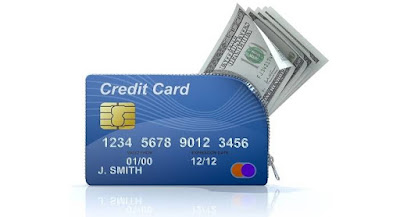Why Credit Card Is Better Than Debit Card
If you’re like many people, you pull out your stalwart piece of plastic: either your bank-affiliated debit card or your rewards credit card.
But is that really the best choice? Is there a reason you should switch to the other side?
There are several key differences between credit cards and debit cards — here’s when you might want to choose one over the other.
A credit card is a card issued by a financial institution, typically a bank, and it enables the cardholder to borrow funds from that institution. Cardholders agree to pay the money back, with interest, according to the institution's terms.
What Are Some Important Advantages of Credit Cards?
1) Offer rewards on purchases you’re already making.
2) Provide additional benefits, like extended warranties on electronics.
3) Give a “free” month-long loan (when you pay your bill in full).
4) Provide more flexibility when booking a hotel or renting a car.
5) Provide protection if your card is lost or stolen.
Earn Rewards
If you already go to Starbucks for your daily latte, you might as well earn some rewards on the money you’re spending.
Here are the most common credit card rewards you can earn:
Cash back: Get a percentage (usually 1-5%) of each purchase back as a statement credit — which is like getting a small discount on everything you buy.
Points or miles: Earn points or miles on every purchase you make, and then redeem them for flights, hotel stays, or statement credits.
Points or miles: Earn points or miles on every purchase you make, and then redeem them for flights, hotel stays, or statement credits.
Manage Fraud Better
Should you be more concerned about losing your debit card or losing your credit card? The former, and here’s why.
When criminals fraudulently use your credit card, they’re spending your credit card issuer’s money.
When criminals fraudulently use your debit card, they’re spending money from your checking account.
In other words, if someone uses your credit card without your permission, you’ll have time to report and manage the fraud before your bill is due.
With a debit card, however, the money leaves your account immediately — whether the charge is fraudulent or not. And, depending on your bank, it might take weeks or months to get your money back. In the meantime, you could miss important bill payments or have to borrow money for daily expenditures.
And, whether you’re victim to credit card fraud or debit card identity theft, federal law dictates your level of liability.
The Fair Credit Billing Act (FCBA) caps the liability of credit card users at $50. Most credit card issuers take this a step further and don’t charge cardholders anything for fraudulent charges. But even if your card issuer doesn’t offer that protection, the FCBA says you’re not responsible for any unauthorized charges if you report the card lost before it’s used.
This limited liability is one of the main reasons experts recommend using credit cards — especially for online purchases.
Debit card fraud protection, on the other hand, is covered by the Electronic Funds Transfer Act (EFTA) — and protection varies.
Here’s what you could owe, based on when you report a debit card loss:
Debit card fraud liability
| If you report: | Your maximum loss: |
| Before any unauthorized charges are made | $0 |
| Within 2 business days after you learn about the loss or theft | $50 |
| More than 2 business days after you learn about the loss or theft, but less than 60 calendar days after your statement is sent to you | $500 |
| More than 60 calendar days after your statement is sent to you | All the money taken from your ATM/debit card account, and possibly more; for example, money in accounts linked to your debit account |
Advantage of “Free” Short-Term Financing
When you use a debit card, the purchase is deducted from your checking account within a few days.
When you use a credit card, you get a “grace period”; you don’t pay for a purchase until your billing cycle ends and your statement balance is due. And with most credit cards, you’ll avoid interest completely if you pay your bill in full.
When you’re on the road, debit cards can be problematic.
Many hotels, gas stations, and rental car companies place “holds” on customer cards that claim an amount of money until the final cost becomes apparent.
Let’s say you’re checking into a hotel for five days. If the hotel charges $200 per night, the hotel will likely place a hold on $1,000, plus extra money for incidentals.
If you’re using a debit card, that money will be frozen until you check out — and that’s even if the company accepts it (many require credit cards).
Not exactly the making of a stress-free vacation, is it? On the other hand, when you use a credit card, a hold reduces your available credit — and not the money in your bank account — which means it won’t put a damper on your vacation budget.
Get Additional Benefits
Depending on your credit card issuer, you may also be eligible for further benefits like:
1) Protection on purchases, including extended warranties on electronics.
2) Travel perks, including rental car insurance and airport lounge access.
3) A smattering of other services, including concierge services to help you buy tickets or make hard-to-get restaurant reservations.
Quick facts: Credit card vs debit card
| Credit card | Debit card |
| Buy now, pay later | Buy now, pay now |
| Interest on balances carried after bill's due date | No interest charges |
| Fees: annual, late payment, foreign transaction, balance transfer, cash advance | Fees: monthly, overdraft, ATM, foreign transaction |
| Can build credit | Can't build credit |
| Limited liability for fraud | Can have full liability for fraud |
Bottom line
Credit cards offer the most benefits and protection against fraud, making them the overall best payment option. However, credit isn't for everyone. If you have a track record of overspending, it may be better to stick with a debit card until you can responsibly manage credit. You can consider debit cards that prevent overdrafts, encouraging you to spend within your means.





Comments
Post a Comment